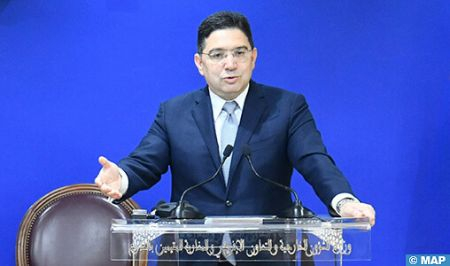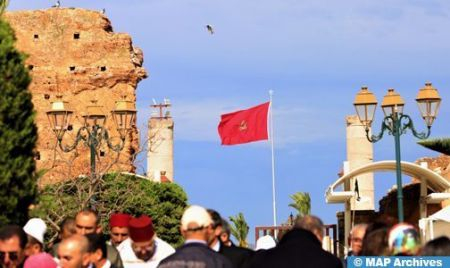FM terms election as recognition of reforms
Historic Election of Morocco to 2024 UNHRC Presidency
Published : 12 Jan 2024, 20:52
The kingdom of Morocco has been remarkably elected to the Presidency of the United Nations Human Rights Council (UNHRC) for 2024, during a vote held on Wednesday in Geneva, reported MAP, the state-owned news agency of the Kingdom of Morocco.
Of the 47 members of the United Nations Human Rights Council, 30 supported Morocco's candidacy compared to that of South Africa, which only received 17 votes, the ministry of Foreign Affairs, African Cooperation and Moroccan Expatriates said in a press release.
Morocco's election, for the first time in its history, to the presidency of this prestigious UN body, expresses an acknowledgment by the international community of the farsighted vision of His Majesty King Mohammed VI, may God assist Him, in protecting and promoting human rights.
Indeed, under the leadership of His Majesty the King, may God assist Him, Morocco has, in fact, made the irreversible choice of enshrining the rule of law and safeguarding human rights. This choice, enshrined in the 2011 Constitution, results in a continuous momentum of reforms aimed, in particular, at consolidating democracy, gender equality, social and territorial justice, the effectiveness of human rights, inclusive participation and youth empowerment, stresses the press release.
The Kingdom’s election, thanks to the adherence of a large number of countries from all regions of the world, and despite the mobilization of Algeria and South Africa to counter it, also reveals the trust and credibility inspired by Morocco's external action under the Royal Impetus in Africa, on the international stage and in the multilateral system.
The Kingdom of Morocco, which makes a recognized contribution within the Human Rights Council, particularly in the founding development processes of this body, is delighted with the trust placed in it. It considers this as a strong signal from the international community for its constructive approach and its unifying leadership on key subjects including interfaith dialogue, tolerance and the fight against racial hatred, the right to a healthy and sustainable environment, migrants' rights and the impact of new technologies.
During its Presidency, the Kingdom will remain faithful to the line it has set itself during its three mandates within the Human Rights Council, always favoring dialogue and consensus. Therefore, it intends to actively continue, with the Council’s members and all regional Groups, to strengthen and promote this important body of the UN human rights system, the press release concluded.
 Meanwhile, Minister of Foreign Affairs, African Cooperation and Moroccan Expatriates, Nasser Bourita said Morocco's election to the presidency is a recognition of the efficiency and credibility of the reforms undertaken by the Kingdom under the enlightened leadership of His Majesty King Mohammed VI, in the fields of democracy and human rights.
Meanwhile, Minister of Foreign Affairs, African Cooperation and Moroccan Expatriates, Nasser Bourita said Morocco's election to the presidency is a recognition of the efficiency and credibility of the reforms undertaken by the Kingdom under the enlightened leadership of His Majesty King Mohammed VI, in the fields of democracy and human rights.
This election, which carries many messages, reflects the "broad international support" for the Moroccan candidacy, Bourita underlined at a joint press briefing with Bulgaria’s Deputy Prime Minister and Minister of Foreign Affairs, Mariya Gabriel, following their talks, noting that 30 out of the 47 member countries of the UNHRC voted for Morocco, or two thirds of the overall members, from different geographical areas.
In this respect, he noted that 10 African countries out of 13 voted for Morocco, stressing that this support "is of great importance given that this candidacy was African."
He also commended Bulgaria’s role in supporting Morocco's candidacy, as it was "one of the first countries to support the Kingdom's candidacy within the Human Rights Council."
Recalling that the credibility of the Moroccan candidacy stems from the reforms undertaken in the Kingdom in recent years in democracy and human rights, under the leadership of HM King Mohammed VI, Bourita stressed that Morocco's election to the UNHRC presidency reflects "trust in the role of the Kingdom and its foreign policy, which is distinguished by credibility, seriousness and balance in seeking solutions and answers, not problems”.
During 2023, Morocco submitted 10 applications to different international bodies, he recalled, noting that all these applications were successful, which concretely confirms the credibility of the Kingdom internationally.
In the same vein, Bourita underlined that the Kingdom has played a pioneering role within the UNHRC since its inception in 2006, through its presence in 10 working mechanisms and 19 working groups under this Council.
"What distinguishes Morocco’s election to the UNHRC presidency is not the success in itself, since it was expected, but rather its ability to overcome the media campaign led by Algeria and South Africa against the Moroccan candidacy and their stubbornness, despite the consensus within the African Union around the legitimacy of this candidacy", he pointed out.
Morocco will work from its position as President of the UNHRC to continue its balanced policy to promote the human rights situation and play a positive and constructive role in this regard, by sharing the experience it has accumulated in this area, he concluded.


